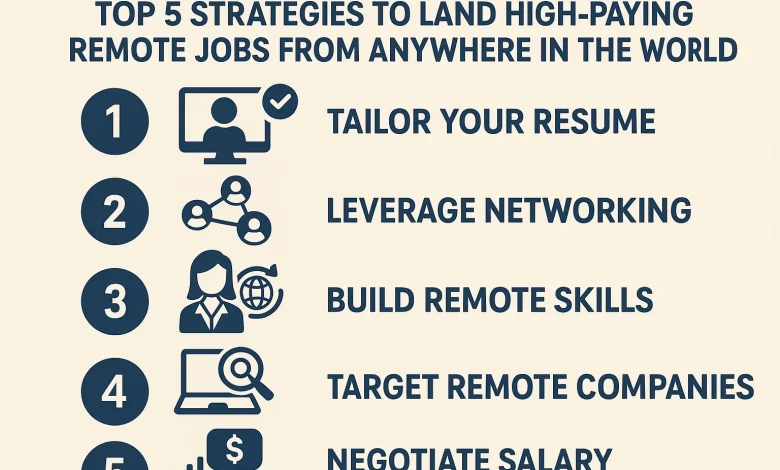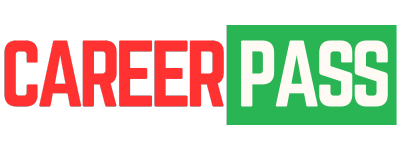Top 5 Strategies to Land High-Paying Remote Jobs from Anywhere in the World
Top 5 Strategies to Land High-Paying Remote Jobs

The rise of remote work has transformed the global job market, offering unprecedented opportunities for professionals to secure high-paying jobs without leaving their home country. Whether you’re in Cairo, Lagos, Mumbai, or a small town, the digital economy allows you to work for top-tier companies worldwide. However, landing a high-paying remote job requires strategy, preparation, and persistence. This step-by-step guide outlines the top five strategies to help you secure lucrative remote work opportunities from anywhere in the world.
Strategy 1: Build a Marketable Skill Set Aligned with Global Demand
High-paying remote jobs often require specialized skills that are in high demand globally. To stand out, you need to identify and develop expertise in fields that companies are actively seeking.
Step-by-Step Approach:
- Research High-Demand Skills: Focus on industries with strong remote work opportunities, such as technology, digital marketing, finance, and project management. According to posts on X, roles like software development, data analysis, and cybersecurity are consistently in demand for remote positions.
- Upskill Through Online Platforms: Enroll in courses on platforms like Coursera, Udemy, or LinkedIn Learning to gain certifications in skills like Python programming, cloud computing (AWS, Azure), or digital marketing (SEO, PPC). For example, a Google Project Management Certificate can boost your credibility for remote project manager roles.
- Showcase Practical Experience: Build a portfolio by working on freelance projects via platforms like Upwork or contributing to open-source projects on GitHub. This demonstrates your skills to potential employers.
- Stay Updated: Follow industry trends on sites like TechCrunch or through X posts to ensure your skills remain relevant.
Pro Tip: Tailor your skill set to niche areas within high-demand fields. For instance, specializing in AI-driven data analytics can set you apart from general data analysts, commanding higher salaries.
Strategy 2: Optimize Your Online Presence and Professional Branding
In a remote job market, your online presence is your first impression. Employers will research you online, so a polished digital profile is critical.
Step-by-Step Approach:
- Create a Stellar LinkedIn Profile: Use a professional headshot, write a compelling headline (e.g., “Remote Software Engineer | Specializing in Full-Stack Development”), and detail your skills and projects in the experience section. Include keywords like “remote work” and specific tools (e.g., React, Salesforce).
- Build a Personal Website or Portfolio: Use platforms like Wix or WordPress to showcase your work. For example, a graphic designer could display client projects, while a writer could share published articles.
- Engage on Professional Platforms: Share industry insights on LinkedIn or comment on relevant X posts to build your network and visibility. Engaging with hiring managers’ posts can put you on their radar.
- Clean Up Your Digital Footprint: Ensure your social media profiles are professional or private. A 2023 study found that 70% of employers screen candidates’ social media before hiring.
Pro Tip: Record a short video introduction for your LinkedIn or portfolio to personalize your application and demonstrate communication skills, which are crucial for remote roles.
Strategy 3: Target the Right Job Platforms and Companies
Not all job boards are created equal. To find high-paying remote jobs, you need to focus on platforms and companies known for offering legitimate opportunities.
Step-by-Step Approach:
- Use Specialized Remote Job Boards: Explore platforms like We Work Remotely, FlexJobs, and Remote.co, which focus exclusively on remote roles. For tech jobs, try AngelList or Stack Overflow Jobs.
- Research Remote-Friendly Companies: Check lists like FlexJobs’ “Top 100 Companies for Remote Jobs” or search X for posts about companies hiring remotely. Companies like GitLab, Zapier, and Automattic are known for fully remote cultures.
- Leverage Niche Communities: Join online forums like Reddit’s r/remotejobs or industry-specific Slack groups to discover unadvertised opportunities. Networking in these spaces can lead to referrals.
- Apply Strategically: Tailor your resume and cover letter for each job, highlighting remote-specific skills like time management and proficiency with tools like Slack or Asana.
Pro Tip: Set up job alerts on these platforms using keywords like “remote,” “work from home,” or specific roles (e.g., “remote UX designer”) to get notified of new postings instantly.
Strategy 4: Master the Remote Job Application and Interview Process
Remote job applications and interviews differ from traditional ones. You need to demonstrate self-discipline, communication skills, and tech-savviness to impress employers.
Step-by-Step Approach:
- Craft a Remote-Focused Resume: Emphasize experience with remote collaboration tools (e.g., Zoom, Trello) and quantify achievements (e.g., “Increased website traffic by 40% through remote SEO campaigns”).
- Write a Tailored Cover Letter: Explain why you thrive in remote settings, citing examples like managing cross-time-zone projects or maintaining productivity independently.
- Prepare for Virtual Interviews: Test your internet connection, use a high-quality webcam, and practice answering questions about remote work challenges (e.g., “How do you stay motivated working from home?”).
- Showcase Cultural Fit: Research the company’s values (e.g., via their website or X posts) and align your answers to reflect shared priorities, such as innovation or diversity.
Pro Tip: During interviews, ask about the company’s remote work policies (e.g., communication expectations, team check-ins) to show proactive interest and ensure the role suits your needs.
Strategy 5: Network Strategically and Build Relationships
Networking is a powerful tool for uncovering high-paying remote jobs, as many opportunities are shared through personal connections rather than public postings.
Step-by-Step Approach:
- Connect with Industry Professionals: Reach out to employees at target companies on LinkedIn with personalized messages (e.g., “I admire [Company’s] remote culture and would love to learn about your experience”).
- Attend Virtual Events: Participate in webinars, virtual job fairs, or industry conferences to meet recruiters and peers. Platforms like Eventbrite often list such events.
- Engage on X: Follow and interact with influencers or companies posting about remote work. For example, a quick search on X for “remote jobs hiring” can reveal real-time opportunities or contacts.
- Seek Referrals: Politely ask connections for introductions to hiring managers. A referral can increase your chances of landing an interview by 50%, according to industry studies.
Pro Tip: Follow up with contacts every few months to stay top-of-mind, sharing updates about your skills or projects to strengthen relationships.
Additional Tips for Success
- Understand Visa and Tax Implications: If working for a company abroad, research any legal or tax requirements. For example, some countries require remote workers to register as freelancers.
- Invest in Your Workspace: A reliable internet connection, noise-canceling headphones, and a professional background for video calls signal to employers that you’re serious about remote work.
- Be Persistent: High-paying remote jobs are competitive. Apply consistently, track your applications, and refine your approach based on feedback.
Conclusion
Landing a high-paying remote job from anywhere in the world is achievable with the right strategies. By building in-demand skills, optimizing your online presence, targeting the right platforms, mastering the application process, and networking strategically, you can unlock opportunities with top global companies. Start implementing these steps today, and you’ll be well on your way to a rewarding remote career that offers both financial success and flexibility.



